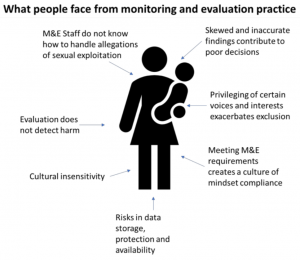Research Opportunity: Harm and the M&E Cycle
We are looking for a researcher to undertake desk-based research into how harm has been defined and integrated into monitoring and evaluation cycles. Please see the Terms of Reference and submit your short proposal by July 5, 2020, or read more about this initiative below.

Monitoring and evaluation practitioners are in a privileged position where they have the opportunity to listen and hear the voices and stories of the people that aid and development agencies work with. These professionals often determine what gets counted and what counts. Yet, practical guidance for commissioners, managers, and evaluators on managing harm is limited. The above graphic shows just some of the areas where the monitoring and evaluation process could contribute to harm.
Our privileged position as M&E practitioners brings with it the responsibility to do no harm. We need to be aware of how we might create or exacerbate harm and also how we might overlook harm due to our positions of power. Evaluators need to play a strong role in identifying areas where M&E can cause harm and develop mitigation strategies to prevent or reduce that potential harm. There has been patchy recognition about the variety of potential harms that can arise from both action and inaction of an evaluator and others involved in monitoring and evaluation processes. There is also a wider discussion to be had around evaluation as a whole and its inherent power dynamics that can lead to, enable, or obfuscate different types of harm and which play a role in determining what is considered to be harmful.
Over the past two years, a group of senior M&E practitioners* has been reflecting on harm in M&E. In the course of this work we’ve organized conversations and collective reflection workshops, think pieces, reports on priority areas and presentations at M&E conferences. The group now looks to build these actions into a practitioner-orientated publication. The research being commissioned aims to further map harms that arise within monitoring and evaluation practice.
As part of this publication, we are looking for a researcher to take a deeper look at how harm has been defined and if and how “do no harm” approaches have been integrated into M&E cycles.
Potential questions for this research include:
- What definition, association, or conception (or definitions, associations, or conceptions) of harm emerge from M&E literature and practice?
- Who are the key social actors who interact in M&E cycles?
- What strategies for addressing, preventing or reducing these harms have emerged and how successful have these been?
Please see the full Terms of Reference and instructions for submitting your application if you are interested in conducting this research. The deadline for submissions is Sunday July 5th.
*The group of M&E practitioners who are working together on this topic includes: Stephen Porter, Evaluation Strategy Advisor – Independent Evaluation Group, World Bank; Veronica Olazabal, Senior Adviser and Director, Measurement, Evaluation and Organizational Performance – The Rockefeller Foundation; Prof. Rodney Hopson, Department of Educational Psychology – University of Illinois; Linda Raftree, Convener of MERL Tech; Adj. Prof Dugan Fraser, Director of the Centre for Learning on Evaluation and Results Anglophone Africa – University of the Witwatersrand.
You might also like
-
Hands on with GenAI: predictions and observations from The MERL Tech Initiative and Oxford Policy Management’s ICT4D Training Day
-
When Might We Use AI for Evaluation Purposes? A discussion with New Directions for Evaluation (NDE) authors
-
A visual guide to today’s GenAI landscape
-
Register now for the NLP-CoP Ethics and Governance Working Group Meeting on April 18th